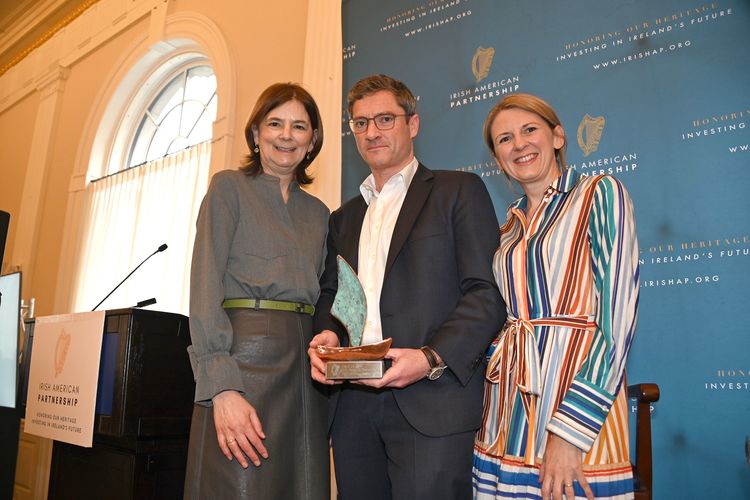[caption id="attachment_67546" align="aligncenter" width="600" caption="Cáitrín McKiernan produced the play "Passages of Martin Luther King" in China. Her father, veteran foreign correspondent Kevin McKiernan, made a documentary about her endeavor."]
Dr. Martin Luther King Jr. had a dream, but he should never be described as a "dreamer."
That's the view of recent Berkeley Law School graduate Cáitrín McKiernan. He was above all else, she has argued, a militant advocate for non-violent change. And it was that reading of the martyred civil rights leader that she aimed to introduce to China via Clayborne Carson's play "Passages of Martin Luther King."
Her father, veteran foreign correspondent Kevin McKiernan, decided that he'd document her efforts for a home movie, being the family's "audio visual guy." However, his project was to evolve into "Bringing King to China," which has already won prizes around the country ahead of its screenings at next week's New York Documentary Festival.
"I saw some larger issues in this," said McKiernan, who is the author of a book about the Kurdish people.
He enlisted the services of famed cinematographer Haskell Wexler, twice an Oscar winner, and also shot footage for "Bringing King to China" in Iraq and India, as well as in China and the United States.
Cáitrín McKiernan first went to China for a year as a 16-year-old exchange student. She quickly learned Mandarin. But it was during a later trip as a Fulbright scholar that she decided, against the backdrop of the Iraq war, to join her Chinese history major and with her interest in African-American studies. The means was the play by Carson, who is director of the King Institute at Stanford University, where she had worked for a year.
"The only reason that Cáitrín succeeded was she didn't know how tall the mountain was," her father was told by an expert on the world's most populous nation.
"This was an impossible task to pull off in China, plus she had to raise a couple of hundred thousand dollars," Kevin McKiernan said.
"She ran into a buzzsaw," her father said, further explaining how and why his idea became the basis of a documentary. "She had several strikes against her in China: she was American, she was young, she was female and she had no background in theater."
In China, the U.S. was being defined as a country that invaded other countries. She wanted to present an alternative side to her native land.
"It was weighing heavily on her," the filmmaker said about the Iraq war itself.
At the time, her father was reporting from that country. One day, his daughter thought he'd died when she read a news crawl report on CNN that said an ABC reporter had been killed in a suicide bombing in the northern part of Iraq. Only through a phone call to New York did she find out that the dead reporter was from the Australian Broadcasting Corporation.
"The entire world needs to learn to have a discussion about how we can live in peace," Caitrin McKiernan said last week. "We don't know where that will end up, but at least we're starting to talk."
Dr. King may not have all the answers to each situation, she said, but he is the essential jumping-off point.
The family's bridge-building with other countries began with Dr. Eoin McKiernan, the founder of the Irish-American Cultural Institute who was born in New York in 1915 to a mother from Lahinch, Co. Clare, and a English-born father whose family roots were in Cavan. He married Jeanette O'Callaghan whose parents were from Cork. They had nine children together
"When I was in high school, my parents took all nine of us to Ireland for one year," Kevin McKiernan recalled. "We lived in Donnybrook. My older sister went to UCD. I went to school at Oatlands College in Mount Merrion, a Christian Brothers school."
McKiernan's wife Catherine is a Minnesotan of Norwegian heritage. Their younger child, Seamus, followed his sister into the same school program in China four years after her. He later worked for the NBA there. "Cáitrín did her thing, and he did his," their father said.
The film recalls earlier sojourns abroad. As a 9-year-old, Cátrín McKiernan was in Nicaragua during the pivotal 1979 election, and even interviewed President Daniel Ortega, leader of the Sandinistas. "The 'Today' show did a 5-minute segment on the 'littlest reporter in Nicaragua,'" her father said.
"I remember tagging along with my dad," she said. The poverty she witnessed helped influence her later choices.
But in the film, when discussing her involvement with cross-cultural projects with her Chinese assistant, McKiernan referenced her grandfather.
The patriarch, who has a cameo in the film with the chairperson of his organization Princess Grace, once said: "What is bred in the bone will out."
McKiernan brought Irish perspectives to the United States over the several decades through his death in 2004, but he sometimes felt that Ireland's government downplayed the Republic's "founding fathers."
Said his son: "He thought they tried to sidestep history."
The filmmaker added: "You know, history erases certain things and it keeps others."
Cáitrín McKiernan had a different problem in China, a director that wanted to impose conspiracy theories about King's assassination onto the play.
"She fought him over what she felt was her responsibility to protect King's legacy," her father said. "He threatened to quit two days before opening night."
That legacy has been the subject of revision and debate over time. His daughter was born, Kevin McKiernan said, the year that Ronald Reagan, a politician hostile to King's activism and the idea of naming a national holiday for him, was elected president.
"He changed his mind because the tide had turned," said McKiernan. However, the message had also been toned down.
"There are two Martin Luther Kings: the dreamer guy that everybody relates to," the filmmaker said. "And then there's the militant pacifist that most people either don't know about or sweep under the rug."
"Bringing King to China" will be shown on next Thursday, Nov. 3 at the IFC Center, 323 Ave. of the Americas (6th Avenue at West 3rd Street in Greenwich Village) 9:30 p.m. and at 11:15 a.m. on Friday morning, Nov. 4. For more information go to www.docnyc.com.










